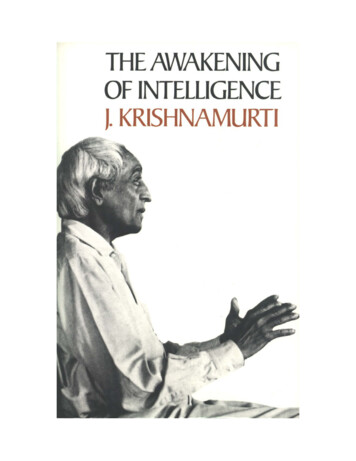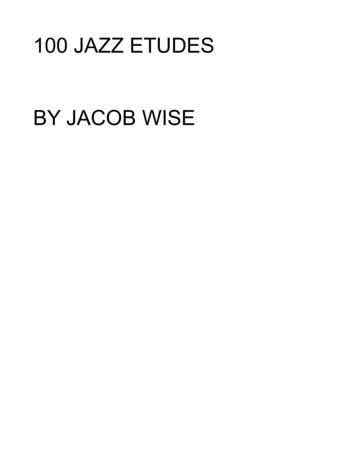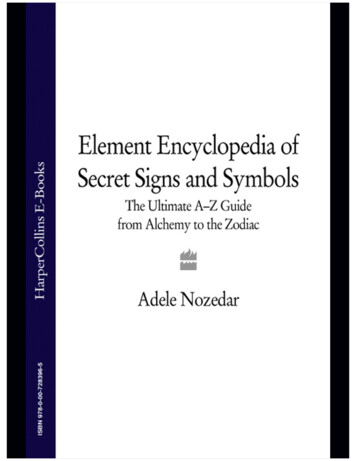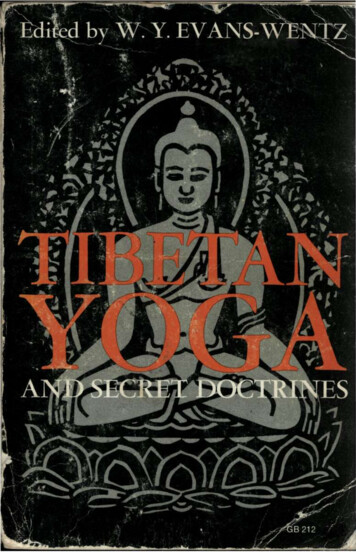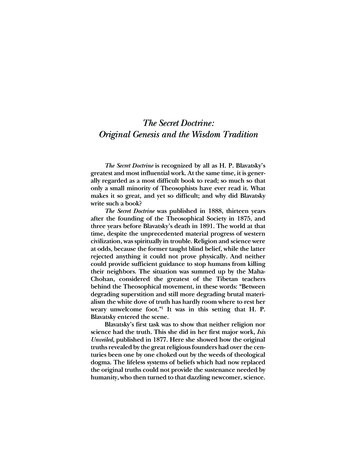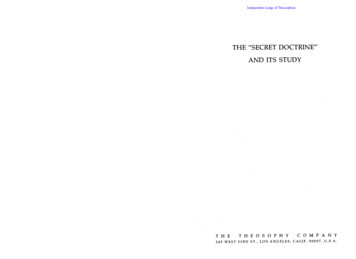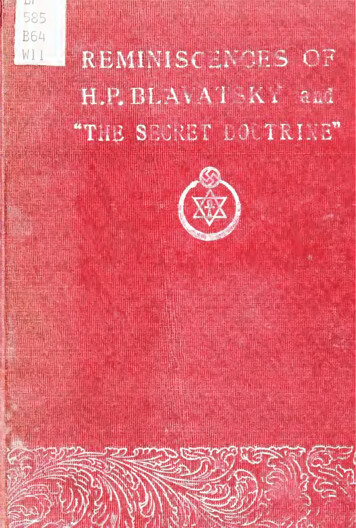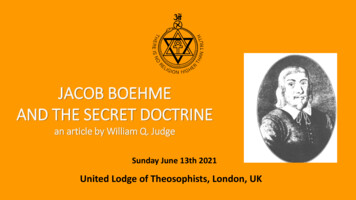
Transcription
JACOB BOEHMEAND THE SECRET DOCTRINEan article by William Q. JudgeSunday June 13th 2021United Lodge of Theosophists, London, UK
“Light on the Path” by MCA devotional readingEveryone who is not a dullard, or a man stupefied by some predominant vice, has guessed, oreven perhaps discovered with some certainty, that there are subtle senses lying within the physicalsenses; there is nothing at all extraordinary in this; if we took the trouble to call Nature into thewitness box we should find that everything which is perceptible to the ordinary sight, hassomething even more important than itself hidden within it; the microscope has opened a world tous, but within those encasements which the microscope reveals, lies a mystery which nomachinery can probe.The whole world is animated and lit, down to its most material shapes, by a world within it.This inner world is called Astral by some people, and it is as good a word as any other, though itmerely means starry; but the stars, as Locke pointed out, are luminous bodies which give light ofthemselves. This quality is characteristic of the light which lies within matter; for those who see it,need no lamp to see it by. The word “star”, moreover, is derived from the Anglo-Saxon “stir-an”, tosteer, to stir, to move, and undeniably it is the inner life which is master of the outer, just as aman's brain guides the movements of his lips. So that although Astral is no very excellent word initself, I am content to use for my present purposes.
“Light on the Path” by MC (cont’d)The whole of “Light on the Path” is written in an astral cipher and can therefore only bedeciphered by one who reads astrally. And its teaching is chiefly directed towards the cultivationand development of the astral life. Until the first step has been taken in this development, theswift knowledge, which is called intuition with certainty, is impossible to man. And this positiveand certain intuition is the only form of knowledge which enables a man to work rapidly or reachhis true and high estate, within the limit of his conscious effort.To obtain knowledge by experiment is too tedious a method for those who aspire toaccomplish real work: he who gets it by certain intuition, lays hands on its various forms withsupreme rapidity, by fierce effort of will; as a determined workman grasps his tools, indifferent totheir weight or any other difficulty which may stand in his way.Light on the Path, p 32-34
“To all Christians, Jews, Turks and Heathens, to all the nations of the earththis trumpet sounds for the last time.“JACOB BOEHME AND THE SECRET DOCTRINEJACOB Boehme (or as some say Behmen) was a German mystic and spiritualist who began to write in the 17th century. In his works heinserted a picture of an angel blowing a trumpet, from which issued these words: "To all Christians, Jews, Turks and Heathens, to all the nations ofthe earth this Trumpet sounds for the last time." In truth it was a curious emblem, but he, the author, was a mystic, and as all experience shows,the path of the mystic is a strange one. It is, as Job says, a path which the "vulture knoweth not." Even as a bird cleaves the eternal ether, so themystic advances on a path nor ordinarily manifest, a way which must be followed with care, because like the Great Light, which flashes forth andleaves only traces when it returns again to its centre, only indications are left for those who come after seeking the same spiritual wisdom. Yet bythese "traces," for such they are called in the Kabbala, the way can be discerned, and the truth discovered.Boehme was poor, of common birth, and totally devoid of ordinary education. He was only a shoemaker. Yet from the mind and out of themouth of this unlettered man came mighty truths.It would be idle to inquire into the complications of Karma which condemned him to such a life as his appeared to be. It must have beenextremely curious, because though he had grasped the truth and was able to appreciate it, yet at the same time he could not give it out in itsperfect form. But he performed his work, and there can be no manner of doubt about his succeeding incarnation. As Krishna says in the BhagavadGita, he has been already or will shortly be "born into a family of wise devotees"; and thence "he will attain the highest walk."His life and writings furnish another proof that the great wisdom-religion―the Secret Doctrine―has never been left without a witness. Born aChristian, he nevertheless saw the esoteric truth lying under the moss and crust of centuries, and from the Christian Bible extracted for his purblindfellows those pearls which they refused to accept. But he did not get his knowledge from the Christian Scriptures only. Before his internal eye thepanorama of real knowledge passed. His interior vision being open he could see the things he had learned in a former life, and at first not knowingwhat they were was stimulated by them to construe his only spiritual books in the esoteric fashion. His brain Jtook cognizance of the Book beforehim, but his spirit aided by his past, and perchance by the living guardians of the shining lamp of truth, could not but read them aright.His work was called "The Dawning of the Eternal Day." In this he endeavors to outline the great philosophy. He narrates the circumstancesand reasons for the angelic creation, the fall of its chief three hierarchies, and the awful effects which thereupon fell upon Eternal Nature. Mark this,not upon man―for he was not yet―but upon the eternal Nature, that is BRAHM. Then he says that these effects came about by reason of the 4
unbalancing of the seven equipoised powers of forces of the Eternal Nature or Brahm. That is to say, that so long as the seven principles of Brahm werein perfect poise, there was no corporeal or manifested universe. So in the Bhagavad-Gita we find that Krishna tells Arjuna that "after the lapse of athousand ages (or Night of Brahm) all objects of developed matter come forth from the non-developed principle. At the approach of that day theyemanate spontaneously." (Bhagavad-Gita, Chap. 8.) Such is the teaching of the Secret Doctrine.And again Boehme shows the duality of the Supreme Soul. For he says in his work "Psychologia Vera cum Supplemento" that these two eternalprinciples of positive and negative, the yea and the nay of the outspeaking Supreme One, together constitute eternal nature,―not the dark world alone;which is termed the "root of nature,―" the two being as it were combined in perfect indissoluble union.This is nothing else but Purush and Prakriti, or taken together, what is referred to in the Bhagavad-Gita where it is said: "But there is anotherinvisible, eternal existence, superior to this visible one, which does not perish when all things perish. It is called invisible and indivisible. This is mySupreme Abode."Clearly the Supreme Abode could never be in Purush alone, nor in Prakriti alone, but in both when indissolubly united.This scheme is adhered to all through this great philosopher's works, no matter whether he is speaking of the great Universe or macrocosm, orof its antitype in man or microcosm. In "De Tribus Principiis" he treats of the three principles or worlds of Nature, describing its eternal birth, its sevenproperties, and the two co-eternal principles; and furthermore in "De Triplici Vita Hominis" he gives the three-fold life of man from which the seven isagain deduced.In "De Electione Gratia" he goes into a subject that often proves a stumbling block to many, and that is the inevitableness of evil as well as of good.From this it is easy to pass to a contemplation of one of the difficult points in occultism as shown in the Secret Doctrine, that nothing is evil, and that even if weadmit evil or wickedness in man, it is of the nature of the quality or guna, which in the Bhagavad-Gita is denominated raja―foulness or bad action. Even this isbetter than the indifferent action that only leads to death. Even from wickedness may and does come forth spiritual life, but from indifferent action comes onlydarkness, and finally death.Krishna says in Bhagavad-Gita, Chap. IV: "There are three kinds of action: first, that which is of the nature of Satyam, or true action; second, thatwhich is of the nature of Raja, or bad action; third, that which is of the nature of Tamas, or indifferent action." He then says: "Although thou wert the greatestof all offenders, thou shalt be able to cross the gulf of sin in the bark of spiritual wisdom"; and a little farther on "The ignorant and man without faith, whosespirit is full of doubt, is lost and cannot enjoy either world." And in another chapter in describing Himself, he says that he is not only the Buddha, but also isthe most evil of mankind or the Asura.This is one of the most mystical parts of the whole secret doctrine. While Boehme has touched on it sufficiently to show that he had a memory ofit, he did not go into the most occult details. It has to be remembered that the Bhagavad-Gita, and many other books treating on the Secret Doctrine, 5
must be regarded from seven points of view; and that imperfect man is not able to look at it from the centre, which would give the whole sevenpoints at once.Boehme wrote about thirty different treatise, all of them devoted to great subjects, portions of the Secret Doctrine.Curiously enough the first treated of the "Dawn of the Eternal Day," and the second was devoted to an elucidation of "The Three Principlesof Man." In the latter is really to be found a sevenfold classification similar to that which Mr. Sinnett propounded in "Esoteric Buddhism."He held that the greatest obstacle in the path of man is the astral or elementary power, which engenders and sustain this world.Then he talks of "tinctures," which we may call principles. According to him there are two principles ones, the watery, and the igneous.These ought to be united in Man; and they ardently seek each other continually, in order to be identified with Sophia or Divine Wisdom. ManyTheosophists will see in this a clue not only to the two principles―or tinctures―which ought to be united man, but also to a law which obtains inmany of the phenomena of magic. But even if I were able, I should not speak on this more clearly.For many inquirers the greatest interest in these works will be found in his hypothesis as to the birth of the material Universe. On theevolution of man from spirit into matter he has much more than I could hope to glance at. In nearly all of it he was outlining and illustrating theSecret Doctrine. The books indicated are well worthy of study not only by Western but also by Eastern metaphysicians.Let us add a few sentences to support this hypothesis from Count Saint Martin, who was a devoted student of these works."Jacob Boehme took for granted the existence of an Universal Principle; he was persuaded that everything is connected in the immensechain of truths, and that the Eternal Nature reposed on seven principles or bases, which he sometimes calls powers, forms, spiritual wheels,sources, and fountains, and that those seven bases exist also in this disordered material nature, under constraint. His nomenclature, adoptedfor these fundamental relations, ran thus: The first astringency, the second gall or bitterness, the third anguish, the fourth fire, the fifth light, thesixth sound, and the seventh he called BEING or the thing itself.”The reader may have begun to think the author did not rightly comprehend the first six but his definition of the seventh shows he was rightthroughout, and we may conclude the real meanings are concealed under these names."The third principle, anguish, attenuates the astringent one, turns it into water, and allows a passage to fire, which was shut up in the astringent principle."There are in this many suggestions and a pursuit of them will repay the student."Now the Divine Sophia caused a new order to take birth in the centre of our system, and there burned our sun; from that do come forth allkinds of qualities, forms and powers. This centre is the Separator.“It is well known that from the sun was taken by the ancients all kinds of power; and if we mistake not, the Hindus claim that when the6
Fathers enter into Para-Nirvana, their accumulated goodness pours itself out on the world through the "Door of the Sun."The Bhagavad-Gita says, that the Lord of all dwells in the region of the heart, and again that this Lord is also the Sun of the world."The earth is a condensation of the seven primordial principles, and by the withdrawal of eternal light this became a dark valley." It is taught inthe East, that this world is a valley and that we are in it, our bodies reaching to the moon, being condensed to hardness at the point where we areon the earth thus becoming visible to the eye of man. There is a mystery in this statement, but not such an one as cannot be unravelled.Boehme proceeds: "When the light mastered the fire at the place of the sun, the terrible shock of the battle engendered an igneous eruptionby which there shot forth from the sun a stormy and frightful flash of fire―Mars. Taken captive by light it assumed a place, and there itstruggles furiously, a pricking goad, whose office is to agitate all nature, producing reaction. It is the gall of nature. The gracious, amiableLight, having enchained unerupted Mars, proceeded by its own power to the bottom or end of the rigidity of Nature, when unable to proceedfurther it stopped, and became corporeal; remaining there it warms that place, and although a valet in Nature, it is the source of sweetnessand the moderator of Mars."Saturn does not originate from the sun, but was produced from the severe astringent anguish of the whole body of this Universe. AboveJupiter the sun could not mitigate the horror, and out of that arose Saturn, who is the opposite of meekness, and who produces whatever ofrigidity there is in creatures, including bones, and what in moral nature corresponds thereto." (This is all the highest astrology, from one who hadno knowledge of it.) "As in the Sun is the heart of life, so by Saturn commenceth all corporeal nature. Thus in these two resides the power of thewhole universal body, and without their power there could be no creation nor any corporification."Venus originates in effluvia from the Sun. She lights the unctuosity of the water of the Universe, penetrates hardness, and enkindles love.""Mercury is the chief worker in the planetary wheel; he is sound, and wakes up the germs in everything. His origin, the triumph of Light overAstringency (in which sound was shut up silent), set free the sound by the attenuation of the astringent power."It is certain that if this peculiar statement regarding Mercury is understood, the student will have gained a high point of knowledge. Aseductive bait is here held out to those striving disciples who so earnestly desire to hold converse with the elemental world. But there is no danger,for all the avenues are very secret and only the pure can prevail in the preliminary steps.Boehme says again: "The Mercury is impregnated and fed continually by the solar substance; that in it is found the knowledge of what wasin the order above, before Light had penetrated to the solar centre."As to the Moon, it is curious to note that he says, "she was produced from the sun itself, at the time of his becoming material, and that the7
moon is his spouse." Students of the story of Adam being made to sleep after his creation and before coats of skin were given, when Eve wasproduced from his side, will find in this a strong hint.The above is not by any means a complete statement of Boehme's system. In order to do justice to it, a full analysis of all his worksshould be undertaken. However, it is sufficient if thoughtful minds who have not read Boehme, shall turn to him after reading this, or if but oneearnest reader of his works, or seeker after wisdom, shall receive even a hint that may lead to a clearing up of doubts, or to the acquisition ofone new idea. Count Saint Martin continually read him; and i p.277 the merest glance at the "Theosophic Correspondence" or, "Man―HisNature, &.," of Saint Martin will show that from that study he learned much. How much more then will the Western mind be aided by the lightshed on both by the lamp of Theosophical teachings."Let the desire of the pious be fulfilled."WILLIAM Q. JUDGETheosophist, April 1886from W. Q. Judge’s Theosophical Articles Vol. 1 p. 270-2778
SOME QUOTES FROM JACOB BOEHME“For we men have one book in common which points to God. Each has it within himself, which is thepriceless Name of God. Its letters are the flames of his love, which He out of His heart in the priceless Nameof Jesus has revealed in us. Read these letters in your hearts and spirits and you have books enough. All thewritings of the children of God direct you unto that one book, for therein lie all the treasures of wisdom.This book is Christ in you.”from Libri Apologetici“Man must here be at war with himself, if he wished to become a heavenly citizen. He must not be a lazysleeper. Fighting must be his watchword, and not with tongue and sword, but with mind and spirit, and notgive over.“Do you believe that my spirit has sucked this [knowledge] out of the corrupt earth, or out of a felt hat?Truly no, for at the time I am describing my spirit did unite with the deepest birth of God. From that I got myknowledge, and from that it is sucked. What I thereafter had to suffer from the Devil, who rules my outerman, you cannot understand. unless you dance in his round.“Therefore if anyone will climb. after me, let him be careful that he be not drunk. For he must climbthrough a gruesome deep and hell, and he will have to endure scoffing and mocking. such knowledgerequires no state of melancholy, but a knightly wrestling.”from Menschw II, vii, 119
SOME QUOTES FROM JACOB BOEHME“I am not a master of literature nor of arts, such as belong to this world, but a foolish and simple-minded man. Ihave never desired to learn any sciences, but from early youth I strove after the salvation of my soul, and thoughthow I might inherit or possess the kingdom of heaven. Finding within myself a powerful contrarium, namely, thedesires that belong to the flesh and blood, I began to fight a hard battle against my corrupted nature, and with theaid of God, I made up my mind to overcome the inherited evil will, to break it, and to enter wholly into the love ofGod in the Christ. I therefore then and there resolved to regard myself as one dead in my inherited form, until theSpirit of God would take form in me, so that in and through Him I might conduct my life. This, however, was notpossible for me to accomplish, but I stood firmly by my earnest resolution, and fought a hard battle with myself.Now while I was wrestling and battling, being aided by God, a wonderful light arose within my soul. It was a lightentirely foreign to my unruly nature, but in it I recognised the true nature of God and man, and the relation existingbetween them, a thing which heretofore I had never understood, and for which I would never have sought.”from Tilk. 20–26.“Above all, examine yourself for what purpose you desire to know the mysteries of God, and whether you areprepared to employ that which will be received for the glorification of God and to the benefit of your neighbour. Areyou ready to die entirely to your own selfish and earthly will, and do you earnestly desire to become one with theSpirit? He who has no such high purposes, and merely seeks for knowledge for the gratification of self, or that hemay be looked upon as something great by the world, is not fit to receive such knowledge.”from Clavis, ii. 3.10
FURTHER READINGSAn article by Mark Jaqua (a Theosophical ediahttps://en.wikipedia.org/wiki/Jakob B%C3%B6hmeFranz -and-the-doctrines-of-jacob-boehme/Great TheosophistsGreat Theosophists--Jacob Boehme (24 of 29) (blavatsky.net)11
Questions &Answers
Secret Doctrine. The books indicated are well worthy of study not only by Western but also by Eastern metaphysicians. Let us add a few sentences to support this hypothesis from Coun

